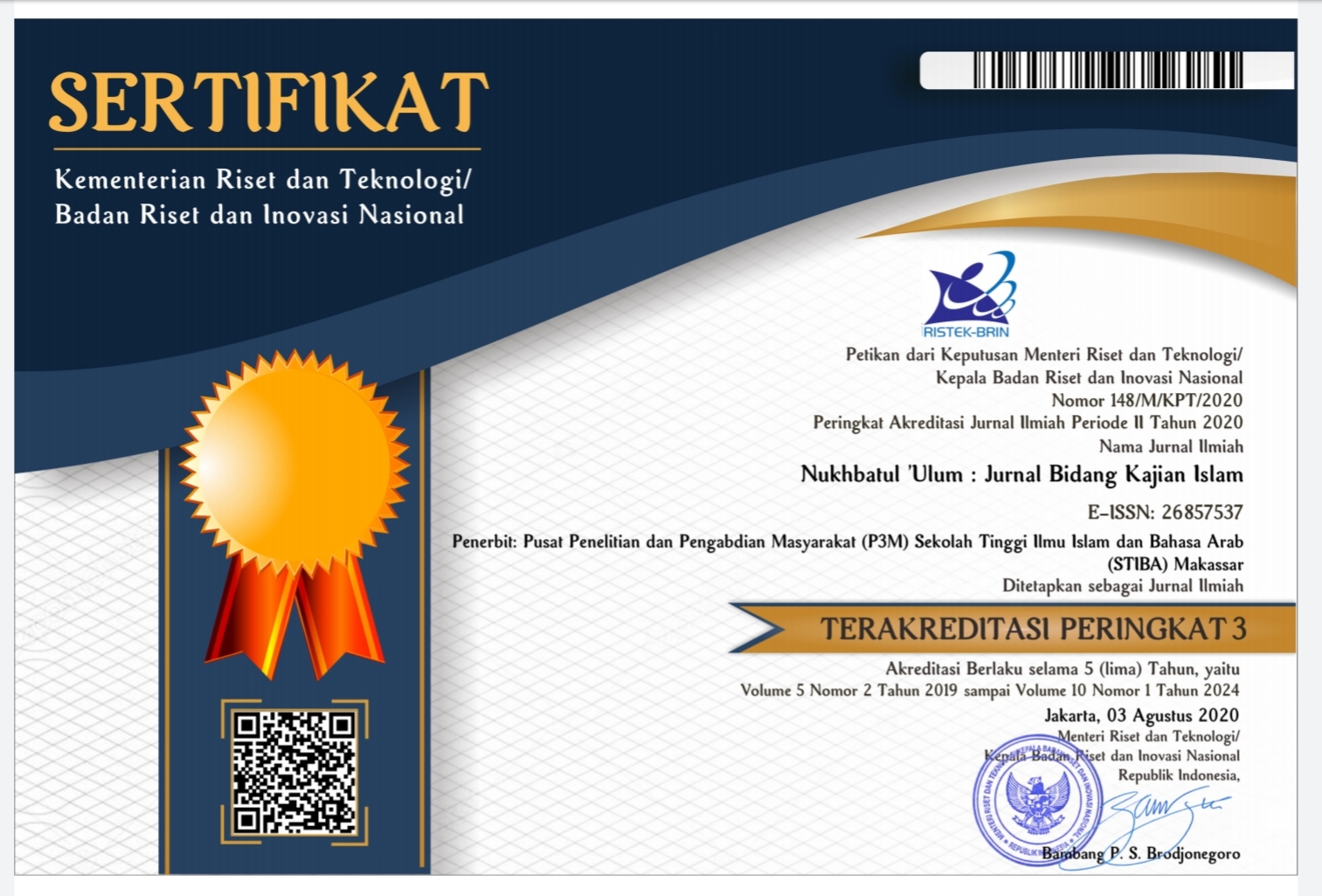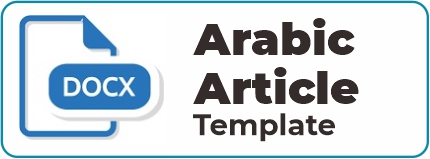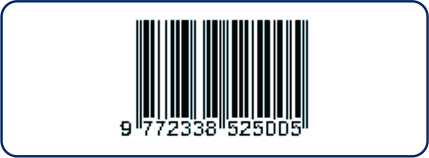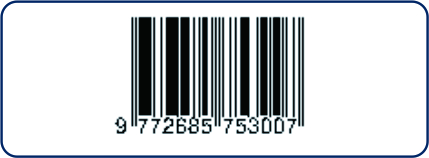Upah Pekerjaan Membangun Rumah Ibadah Nonmuslim di Lingkungan Mayoritas Muslim dalam Perspektif Hukum Islam
Wages for Work to Build a Non-Moslim House of Worship in A Muslim Majority Environment in the Perspective of Islamic Law
Abstract
This study aims to find out and understand the wage law for building a house of worship for other religions in the perspective of Islamic law with the following details, namely; First, what is the view of Islam on wages. Second, how does the law take wages from the construction of houses of worship for religions other than Islam in the perspective of Islamic law. This type of research is qualitative-descriptive. Qualitative is seen as a research method that usually produces descriptive data, namely in the form of written or spoken words from the data studied. The descriptive research method aims to make a description, namely a systematic, factual and accurate picture or painting of the phenomenon or relationship between the phenomena being investigated and includes library research because this study completely requires a study of the written works of experts who related to the discussion. This research is also normative because it will examine the texts of the Qur'an and Hadith or the thoughts of scholars related to the discussion. The results of this study based on the study found that: First, the law of wages or ijarah in the view of Islam is something that is permissible because it is part of of muamalah where the basis is permissible. It is strengthened that wages or Ijarah are clearly mentioned in the Qur'an and hadith as well as the consensus of the scholars who show their abilities. Second, it is permissible to take wages from the work of building a house of worship for a religion other than Islam, from the perspective of Islamic law, if the worker is in a dharurah condition with the following limitations, which are a reflection of the following conditions: (1) in a very hungry condition, and no food is found to sustain them. life. (2) is forced by someone to eat what is unlawful, so that the unlawful becomes lawful for him.
Downloads
References
Al-Bukhari, Abu Abdillah Muhammad bin Ismail, Sohih Bukhari, (Cet. Ke-1 Darr Thauq An-Najah Tahun 1422 H).
Ad-Dimasyqi, Abu Zakariya Mahyuddin Yahya bin Syaraf An-Nawawi, Raudhatu ath-Thālibin, (Cet; ke-3; Damaskus: al-Maktab al-Islam, 1412 H/1991 M).
Adz-Dzahidi, Hafidz Tsanaullah, Talkhis Al-Ushul (Cet; ke 1 : Markaz Al-Makhtuthat Wa Ats-Tsurats Wa Al-Watsabiq, Tahun 1414 H / 1994 M, Kuwait).
Aiman, Umu, Syari’at Berpakaian Yang Baik Dalam Al-Qur’an Surah Al-A’raf Ayat 26 (Studi Tafsir Ibnu Katsir), (Ilmu Al-Qur’an Dan Tafsir Fakultas Ushuluddin Dan Studi Agama Universitas Islam Negeri Sulthan Thaha Saifuddin Jambi 2019).
Al-Jauziyah, Syamsuddin Abu 'Abdillah Muhammad bin Abu bakar Ibnu al-Qayyim, Ahkāmu Ahli Adz-Dzimmah, Cetakan Dar al-Hadis, Edisi tahun 1426 H / 2005 M.
Al-Jaziri, Abdurrahman, Kitab Al-Fiqh ‘Ala Al-Mazahib Al-‘Arba’ah, Juz IV (Cet; Dar Al-Fikr, t.t)
Al-Khadimi, Nur Ad-Din bin Mukhtar, Ilmu Al-Maqashid Asy-Syari’ah, (Cet. Ke-1; Maktabah Al-‘Abikan, Tahun 1421 H / 2001 M).
Al-Fauzan, Sholeh Al-Fauzan bin Abdillah, Al-Mulakhkhas Al-Fiqh, (Cet. Ke-1, Dar Al-‘Ashimah Riyadh, Tahun 1423 H).
Al-Maqdisi, Abu Muhammad Muwaffiquddin Abdullah bin Ahmad bin Muhammad bin Qudamah, Al-Mughni Ibnu Qudamah, (Cetakan : Maktabah Al-Qohirah, Tahun 1388 H / 1968 M).
Al-Muqbil, Umar bin Abdillah bin Muhammad, Qowaid Nabawiyah, (Cet; Dar Al-Hadharah Linnasyri Wattauzi’-Riyadh, 1435 H).
Al-Qahthani, Abu Muhammad Sholeh bin Hasan Alu ‘Umair, Majmuah Al-Fawaid Al-Bahiyah ‘Ala Manzumati Al-Qawaid Al-Fiqhiyah, (Cet. Ke-1, Dar Ash-Shomi’I Linnasyri Wattauzi’-Saudi Arabiyah, Tahun 1420 H / 2000 M).
Al-Qurasyi, Abu Al-Fida’ Ismail bin Umar bin Katsir, Tafsir Alquran Al-Adzim Ibnu Katsir, (Penerbit : Dar Thaibah Linnasyri Wattauzi’), Cet; ke II tahun 1420 H / 1999 M.
Al-Shabuniy, Muhammad ‘Ali, Rawai’ Al-Bayan Tafsir Ayat Min Al-Qur’an, )Cet; 3 Maktabah Al-Ghazzali, Damshiq-Muassasah Manāhil Al-‘Urfan, Byruth, 1400 H/ 1980 M).
Arikunto, Suharsim, Prosedur Penelitian Suatu Pendekatan Praktik, (Jakarta:
Rineka Cipta, 2010 M).
Arrummani, Zaid bin Muhammad, Maqoshid Asy-syariatil Islam, (Cet; Al-Kitab Mansyur ‘Ala Mauqiu’ Wizarah Al-Auqof As-Sau’diyah, t.t).
As-Sofa, Muhammad Fahmi Ali Abu, At-Tasyri’u Shalih Littatbiq Fii Kulli Zaman Wa Makān, (Cetakan ke-1; Jamiah Islamiyah, Tahun 1397 H / 1977 M).
Az-Zarqa, Ahmad bin Asy-Syekh Muhammad,, Syarh Al-Qawaid Al-Fiqhiyah (Cet; 2 Dar Al-Qalam, Suriah Tahun 1409 H / 1989 M).
Dahlan, Abd. Rahman M.A., Ushul Fiqh, Cetakan Pertama (Jakarta: 2010).
Dana, Lia Dwi, Tinjauan Hukum Islam Tentang Upah Sebagai Pekerja Pramusaji Bar, (Universitas Islam Negeri Raden Intan Lampung, lampung 1440 H/2019 M).
Daryni, Fathi, Al-Manhaj al-Ushuliyyah fi Ijtihad bi al-Ra‟yi fi al-Tasyri, (Cet; Daral-Kitab al-Hadits, Beirut, 1975).
Depertemen Agama RI, Al-Qur’an dan Terjemahannya (Edisi Penyempurnaan), (Jakarta: Lajnah Pentashih Mushaf Al-Qur’an Kemenag RI, 2020).
Ghaffar, Muhammad Hasan Abd, Qowaid Al-Fiqhiyah Bayna Al-Asholah Wa At-Taujih, t.t.
Ghalib, Muhammad bin Jarir bin Yazid bin Katsir bin, Jami’ Al-Bayan fii Ta’wil Alquran, (Cet; ke-1 : Muassasah Ar-Risalah Tahun 1420 H / 2000 M).
Hanik, Nurma, Persepsi Pemahat Patung Terhadap Upah Mematung Di Kecamatan Trowulan Kabupaten Mojokerto, (IAIN Sunan Ampel, Surabaya 2010).
https://bincangsyariah.com/kalam/proyek-pembangunan-gereja-bagi-muslim/ (10 Agustus 2021).
http://masykuriabdillah.lec.uinjkt.ac.id/home-1/itservicedesk (22 Desember 2021)
https://bincangsyariah.com/kolom/hukum-menjaga-dan-membangun-rumah-ibadah-non-muslim/ (22 Desember 2021)
Hajjaj, Abu al-Husain Muslim bin, Shohih Muslim, (Cetakan Darr Ihyaa at-Turats al-Arabi, Biruth, 1412 H / 1991 M).
KEMDIKBUD RI, “KBBI DARING”, Situs Resmi KBBI KEMDIKBUD RI, https://kbbi.kemdikbud.go.id (17 Maret 2021).
Maesaroh, Siti, Tinjauan Hukum Islam Terhadap Praktik Upah Kerja Buruh Cangkul (Lampung, 2019).
Majah, Muhammad Bin Yazid Bin, Sunan Ibnu Majah, Juz II, No. 2443 (Dar Ihya’ al-Kutub al ‘Arabiyah, 2009).
Muhammad, Abu Muhammad Al-Husain bin Mas’ud bin, Tafsir Al-Baghawi, Cet; ke-1 Dar Ihya’ at-Turats, Byruth 1420 H.
Mukminiati, Ummahatul, Tinjauan Hukum Islam Terhadap Upah Minimum Regional (Sumatera Selatan. 2015).
Pusat Pengkajian Dan Pengembangan Ekonomi Islam (P3EI) Uneversitas Islam Indonesia, Ekonomi Islam, Rajawali Pers, Jakarta, 2013.
Rusd, Muhamammad bin Ahmad bin Muhammad bin, Bidāyatul al-Mujtahid Wa nihāyatul al-Muqtashid, (Cet; Dar al-Hadis), Edisi tahun 1425 / 2004.
Sabiq, Sayyid, Fikih Sunnah, alih bahasa oleh H. Kamaludin A. Marjuki, Bandung: al-Ma’arif, Cet. Ke-7.
Siyoto, Sandu SKM., M.Kes M. Ali Sodik, M.A, Dasar Metodologi Penelitian, (Yogyakarta: Literasi Media Publishing, Juni 2015).
Soekanto, Soejono dan Sri Mamudji, Penelitian Hukum Normatif Suatu Tinjauan Singkat, (Jakarta:PT RajaGrafindo Persada, 2014).
Syafi‟i, Muhammad, Bank Syari‟ah Dari Teori Ke Praktek (Jakarta: Gema Insani Press, 2001).
Suhendi, Hendi, Fiqih Muamalah, (Jakarta: PT Raja Grafindo Persada, 2011).
Undang-Undang No 13 Tahun 2003, tentang Ketenagakerjaan, (Jakarta:BP. Cipta Jaya, 2003).
Yusdono, Karniati, Fleksibelitas Hukum Islam Dalam Perspektif Darurat Dan Maslahat, (Fakultas Syari’ah dan Hukum Universitas Islam Negeri Alauddin Makassar 2013).
Zed, Mestika, Metode Penelitian Kepustakaan, (Cet III; Jakarta: Yayasan Pustaka Obor Indonesia, 2014 M).
Zuhayliy, Wahbah, al-Fiqh al-Islamiy wa Adillatuhu , (Beirut: Dar al-Fikr al-Mu’ashir, t.t.).
Copyright (c) 2022 Ahmad Syaripudin, Zulfikar Alim Said

This work is licensed under a Creative Commons Attribution-NonCommercial-ShareAlike 4.0 International License.


















